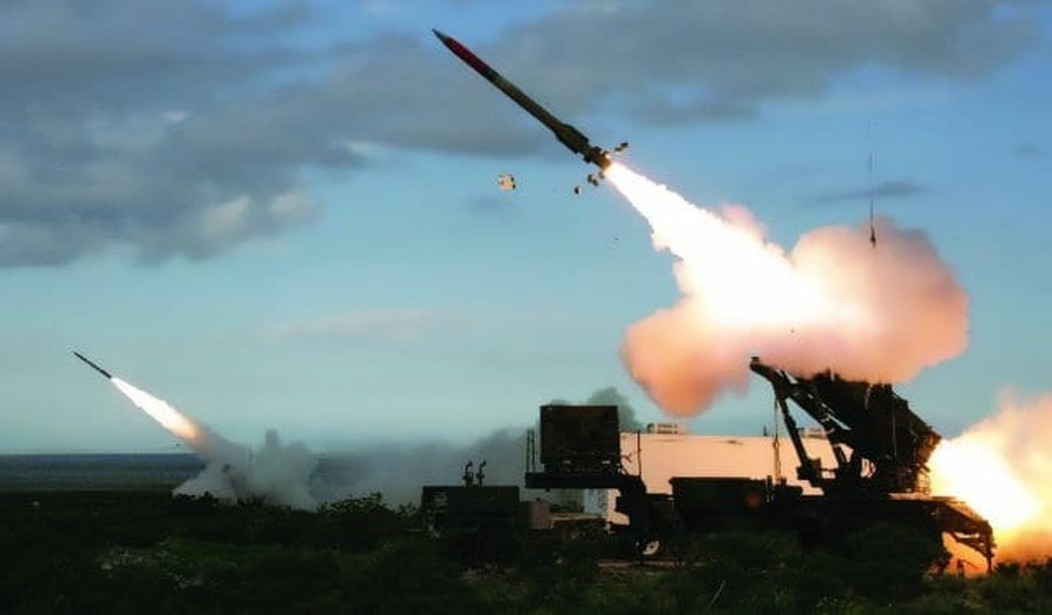The slightest whiff of American vulnerability is like a juicy steak to a starving dog. It’s always been the case and always will be the case. Perceived American vulnerability is a peril with global implications, and we’ve been generally on top of it via strategic doctrines such as the big one, Peace Through Strength.
Right now, America’s enemies are poking around looking to take advantage of the coronavirus crisis. Lord knows what crisis will befall us and our allies next, but everyone knows that there will be one. And another, and another. As our challenges grow more complicated and frequent, Peace Through Strength never looked so good, and has never been more critical.
Currently, Congress is in the process of drafting up the annual National Defense Authorization Act (NDAA), the bill that prioritizes the defense capabilities for the year ahead. My Missile Defense fanboydom goes back to my days running the American Conservative Union. I remember being in then-Vice President Dick Cheney’s office shortly before 9/11 as part of a small working group helping to promote the Bush administration’s bold plans to accelerate SDI, then came 9/11, which brought all of that to a grinding halt. It shouldn’t have, and our recent uptick in interest in prioritizing missile defense is needed and encouraging.
To that end, the developing NDAA legislation should absolutely promote the Ground-Based Midcourse Defense program (GMD) as a critical last line of defense to a nuclear attack on the United States. Some say we got caught flat-footed with Coronavirus. We can recover from that and dust ourselves off, thankfully. That’s not going to be an option if God forbid we get caught flat-footed when some asswipe gets his fingers on a Red Button.
Simply put, the GMD is the strongest technology there is that is capable of protecting the homeland from intercontinental nuclear missile attack, primarily because it destroys intermediate and long range ballistic missile threats in space – before they re-enter the atmosphere and make it to their U.S. or allied target(s).
Peace Through Strength. Now more than ever. (Such a Reaganite. Two campaign slogans in one sentence. Boom).
So again, we Americans are living through a dangerous time with a weakened economy and adversaries looking to take advantage both economically and perhaps militarily, directly and indirectly. We must make it crystal clear that those who attempt such things are on a fool’s errand.
Iran was the first nation to probe and test resolve in the midst of this current crisis when they deployed gunboats to harass U.S. Navy Ships in the Persian Gulf. According to CBS News, “11 ships with Iran’s Islamic Revolutionary Guard Corps Navy ‘repeatedly conducted dangerous and harassing approaches’ of U.S. ships in the North Arabian Gulf, according to the 5th Fleet.” In response, President Donald J. Trump clearly and loudly instructed the Navy to simply blow the Iranian boats out of the water on sight if they tried it again. Guess what? Exactly.
North Korea is another good case study showing nations probing America’s resolve during the coronavirus crisis. Although North Korea has continued to flout Security Council resolutions stopping nuclear and ballistic missile programs predating the coronavirus, they have upped their actions recently. The New York Times reported on April 14, 2020, “North Korea fired several short-range missiles off its east coast on Tuesday, a day before South Korea is scheduled to hold elections for its 300-seat Parliament.” Cruise missiles technically do not violate the U.N. Security Council resolution, yet this action was clearly intended to be provocative. Wouldn’t it be nice to know definitively that no matter what the North Koreans come up with missile-wise, we’ve already rendered them useless because we have functioning, deployed assets like GMD at the ready?
In the late 1990s, North Korea’s aggressive pursuit of nuclear and ballistic missiles led the U.S. to withdraw from the 1972 Anti-Ballistic Missile Treaty (AMB) that restricted missile defense deployment. The defense non-profit think tank Missile Defense Advocacy puts it this way: “In its 2001 statement announcing its intention to withdraw from the ABM Treaty, the White House cited the shift in geostrategic challenges as the primary motivation for breaking the treaty saying “[the] threats we face today are far different from those of the Cold War.” The goal was to deploy an operational missile defense in 2004. Back in 1983, President Ronald Reagan birthed the idea of the aforementioned SDI that would “give us the means of rendering these nuclear weapons impotent and obsolete.” That vision is now reality, but not without some internal opposition.
At the time, Reagan’s idea was mocked by many as Star Warsian fantasy (“You can’t shoot a bullet with a bullet!”) and later scrapped by President Bill Clinton in 1993. In 1998, a commission lead by former Defense Secretary for President Gerald Ford, Donald Rumsfeld, produced a report that led Congress to pass the 1999 Missile Defense Act ordering the Pentagon to deploy missile defense technology. This lead to the Ground-based Midcourse Defense (GMD) program’s deployment in 2004.
Since that time, missile defense has been an integral part of our national defense capabilities to protect American citizens from missile attack. Whether it be a single missile or multiple missiles, having this program provides both a deterrent and an actual defense to protect American lives. It is a necessary program that needs to be a priority for Congress and the Trump Administration. Expensive? Yes. But it works and it matters. Unlike other expensive things the Pentagon has gotten itself wrapped up in lately.
GMD hit a bump when Michael Griffin, Undersecretary of Defense for Research and Engineering, recommended termination of the program in a way that would have set back missile defense for years. A Pentagon review board rejected the recommendation and awarded a contract modification as reported by UPI in December of last year. The program is back on track, but needs more support this year.
When Congress revisits the NDAA bill, let us hope they will see the issue and the challenge clearly and send a strong message to our adversaries by fully committing to the Ground-based Midcourse Defense program. A strong commitment to this technology by the Congress and President Trump will breathe new life into the best, most American military doctrine there has ever been: Peace Through Strength.
Christian Josi is a veteran communications advisor and political operative, a proven non-profit management expert, and a frequent opinion columnist for a variety of publications on a variety of subjects. He is the Founder and Managing Director of C. Josi & Company, a global public affairs resource organization based in Virginia Beach and Washington.










Join the conversation as a VIP Member